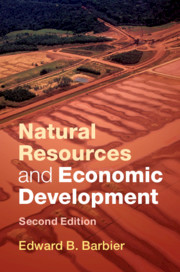Book contents
- Natural Resources and Economic Development
- Natural Resources and Economic Development
- Copyright page
- Dedication
- Contents
- Figures
- Tables
- Acknowledgments
- Introduction
- Part I Overview
- 1 Natural Resources and Developing CountriesAn Overview
- 2 Natural Resource-Based Economic Development in History
- 3 Does Natural Resource Dependence Hinder Economic Development?
- 4 Frontier Expansion and Economic Development
- Part II Land and Water Use Change
- Part III Policies for Sustainable Resource-Based Development
- References
- Index
2 - Natural Resource-Based Economic Development in History
from Part I - Overview
Published online by Cambridge University Press: 31 August 2019
- Natural Resources and Economic Development
- Natural Resources and Economic Development
- Copyright page
- Dedication
- Contents
- Figures
- Tables
- Acknowledgments
- Introduction
- Part I Overview
- 1 Natural Resources and Developing CountriesAn Overview
- 2 Natural Resource-Based Economic Development in History
- 3 Does Natural Resource Dependence Hinder Economic Development?
- 4 Frontier Expansion and Economic Development
- Part II Land and Water Use Change
- Part III Policies for Sustainable Resource-Based Development
- References
- Index
Summary
Chapter 1 ended with a key paradox concerning the role of natural resources in economic development: Why is it that, despite the importance of natural capital for sustainable economic development, increasing economic dependence on natural resource exploitation appears to be a hindrance to growth and development in the majority of low- and middle-income economies of the world? Of course, it is important to examine this paradox in light of the use of natural resources by today’s developing economies and how current economic theories represent this use. In fact, Chapters 3 and 4 will do precisely that.
- Type
- Chapter
- Information
- Natural Resources and Economic Development , pp. 49 - 106Publisher: Cambridge University PressPrint publication year: 2019
- 1
- Cited by

